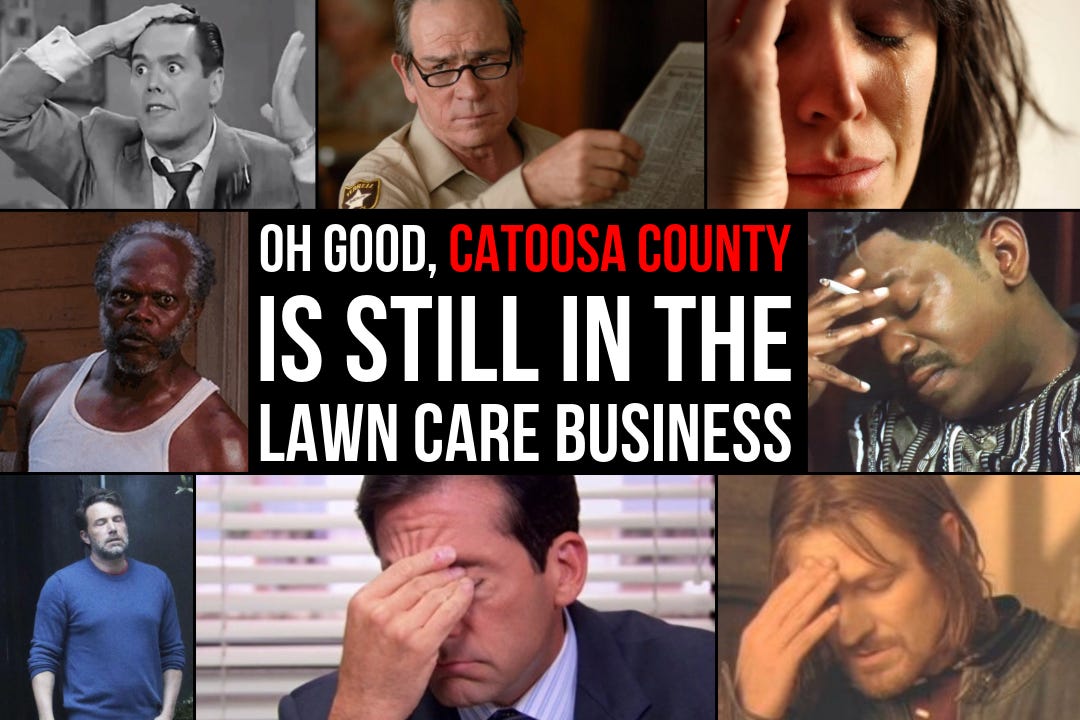Oh Good, Catoosa County Is Still In The Lawn Care Business
Somewhere along the way, local governments across Georgia decided that mowing was too important to be left to the professionals.
Rest easy, citizens of Catoosa County. The government is still moonlighting as expert landscapers with the county mowing service.
The county government recently took delivery of shiny new tractors tricked out as mowing machines and posted about it on the government facebook page. This made clear in-house mowing was how things will be done in Catoosa. Which is great, right? Because if there’s one thing history has taught us, it’s that government-run services are always efficient, cost-effective, and deliver better services.
Just look at the DMV. Or public housing. Or Amtrak.
I know, I know—“It’s just mowing,” some might say. But that’s the problem, isn’t it? This is just mowing. A task so simple that millions of Americans handle it every Saturday with a push mower and a little sweat. A service so widespread that private companies fiercely compete to offer it for the lowest price. And yet, somehow, local governments everywhere have convinced themselves that Yep, this is a vital function and we’re the best for the job.
When Did Local Government Become a Landscaping Company?
The idea that government should be directly responsible for roadside mowing is absurd on its face. It’s like asking the county commissioners to personally cater for your wedding—sure, they could do it, but do you really think it’s going to be efficient, cost-effective, or great?
Yet Somewhere along the way, local governments across Georgia and the country decided that mowing was too important to be left to the professionals.
Instead of hiring a private company to handle mowing through a competitive contract (where underperformance means losing the job), the county has long taken the classic bureaucratic approach:
Buy expensive equipment with taxpayer money.
Hire full-time government employees with salaries, benefits, pensions, and all the overhead that comes with it.
Maintain and store the equipment year-round, even when it’s not being used.
Ensure that, no matter how inefficient the operation becomes, it can never be fired.
Meanwhile, in the private sector, companies mow for a living. They already own the equipment. They maintain it on their dime. They hire employees based on demand, not because some bloated government payroll requires it or making trimming difficult. And if they don’t do the job well? They lose the contract and someone else gets hired.
That’s called competition—a concept that governments actively avoid because it exposes just how wasteful and unnecessary their operations are.
Instead they opt for doing it inhouse. It’s the least efficient way to get the job done, which makes it the most predictable way for the government to handle it.
What’s the Cost? Funny You Should Ask…
Does anyone know what the expected level of service is for county mowing of right of ways?
How many miles of roadside get cut? How often?
What is the performance standard? X number cuts per year or maintain a required max grass height?
And, most importantly, what is the actual cost of providing that level of service in-house?
The uncomfortable truth? No one knows. Or if they do know, they're certainly not advertising it.
This Isn’t Just Catoosa—It’s Everywhere
Lest anyone think I’m unfairly picking on Catoosa County, let me assure you: this is a nationwide phenomenon. Governments across Georgia (and the country) insist on doing things in-house that private companies could do more efficiently and at lower cost.
Counties running their own garbage collection instead of hiring private haulers. City road crews with bloated staff and outdated equipment. Public transit systems hemorrhaging money despite private transit or ride share companies thriving.
It happens in nearly every local government.
The Case for Privatization
At this point, it’s not even a debate—privatization works.
It brings competition into the equation, which drives down costs.
It ensures accountability—if a private company doesn’t perform, they lose the contract.
It eliminates government waste, because taxpayers aren’t on the hook for permanent employees and depreciating equipment.
If Catoosa County (or any other county) truly wanted to be efficient or do something DOGE-like, they’d be putting out competitive bids for mowing services, they’d define the exact level of service they expect, set clear performance standards, and award the contract to the lowest qualified bidder.
If the company doesn’t perform? Fire them and hire another. It’s how the free market works. It’s why you don’t see inefficient lawn care businesses surviving in the private sector—they either perform, or they go under.
Meanwhile, a government-run mowing crew that underperforms? They just get a budget increase.
A Bigger Conversation in Catoosa and Beyond
The new group of commissioners in Catoosa County are thoughtful, smart, and willing to ask good questions—the kind of leaders that can set a standard of leadership for the future.
Governments and leaders have an opportunity right now thanks to Elon and the DOGE effort making efficiency the talk of the nation. Instead of just accepting that this is how it’s always been done, why not take a real, hard look at whether this model for service delivery actually makes financial sense? Is it the best deal for taxpayer?
If there was ever a time to re-evaluate whether in-house mowing is the most efficient use of tax dollars, it’s now. Because if a thorough cost analysis finds that privatization would save money and improve service (as it most assuredly would), then this conversation shouldn’t stop at mowing.
It should spark a larger discussion about:
What other services the government is handling in-house that could be outsourced for less.
How privatization could maximize tax dollars and improve citizen satisfaction?
What other innovatives ideas should we look at?
How local government can focus on core responsibilities and let professionals handle everything else?
That’s the kind of forward-thinking approach that respects taxpayers and promotes and ensures efficiency—not just for mowing, but for every dollar Catoosa County spends.



